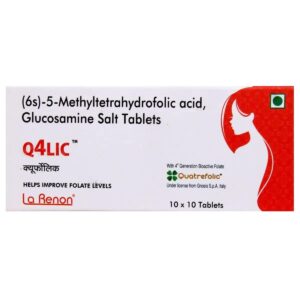FOLIC ACID + GLUTAMIC ACID
Folic Acid: Drug: Folic Acid
Drug Class: Vitamin (B9)
Use: Folic Acid is a form of B vitamin that is essential for the synthesis and repair of DNA. It is commonly used to treat and prevent deficiencies of folic acid in the body, which can occur due to poor diet, certain medical conditions, or medications that may interfere with the body’s ability to absorb or utilize folic acid. Folic acid supplementation is also important during pregnancy to prevent neural tube defects in the developing fetus.
Mechanism of Action: Folic Acid is converted to its active form, tetrahydrofolic acid, within the body. Tetrahydrofolic acid plays a crucial role as a coenzyme in various metabolic processes, including the synthesis of DNA, RNA, and certain amino acids. By participating in these processes, folic acid helps to support the normal growth and development of red blood cells, as well as the production of genetic material.
Dose: The recommended dose of Folic Acid varies depending on the specific indication. For most adults, the typical daily dose ranges from 400 to 800 micrograms. Pregnant women are usually advised to take a higher dose, commonly 600 to 800 micrograms per day. It is best to follow the dosage instructions provided by a healthcare professional or as mentioned on the product label.
Side Effects: Folic Acid is generally safe and well-tolerated when taken at the recommended doses. However, like any medication, there can be potential side effects. Some common side effects may include nausea, loss of appetite, bloating, gas, and a bitter or bad taste in the mouth. These side effects are usually mild and transient. In rare cases, high doses of folic acid (above 1 mg per day) can cause more serious side effects such as allergic reactions, skin rash, and confusion. It is important to seek medical attention if any severe or persistent side effects occur.
It is worth noting that Folic Acid supplementation may interact with certain medications. For instance, some antiepileptic drugs, such as phenytoin and phenobarbital, may reduce the absorption or increase the breakdown of folic acid, requiring adjustments in the dosage. Therefore, it is important to inform your healthcare provider about all the medications you are taking before starting Folic Acid supplementation.
Glutamic Acid: Glutamic Acid, also known as glutamate, is a non-essential amino acid that serves as a neurotransmitter in the central nervous system. It plays a crucial role in various physiological processes, including cognition, memory, and neural plasticity.
Glutamic Acid is commonly used as a dietary supplement and is sometimes used as a treatment for certain medical conditions. It is also a component of many food additives, such as monosodium glutamate (MSG) which is used as a flavor enhancer.
In terms of its mechanism of action, Glutamic Acid functions as an excitatory neurotransmitter by binding to specific receptors in the brain, known as glutamate receptors. This binding activates these receptors, which can lead to increased neuronal activity and communication between nerve cells.
The recommended dose of Glutamic Acid depends on the specific application and individual needs. As a dietary supplement, doses typically range from 500 mg to 2 grams per day. It is important to follow the instructions on the product label or consult with a healthcare professional for appropriate dosage guidance.
Although Glutamic Acid is generally recognized as safe, certain side effects may occur, especially at high doses. These can include gastrointestinal discomfort, such as upset stomach, diarrhea, or abdominal pain. Some individuals may also experience headaches or allergic reactions, although these are rare.
It is important to note that Glutamic Acid supplementation may not be suitable for everyone, particularly individuals with certain medical conditions or those taking specific medications. It is always advisable to consult with a healthcare professional before starting any new dietary supplement or medication.

